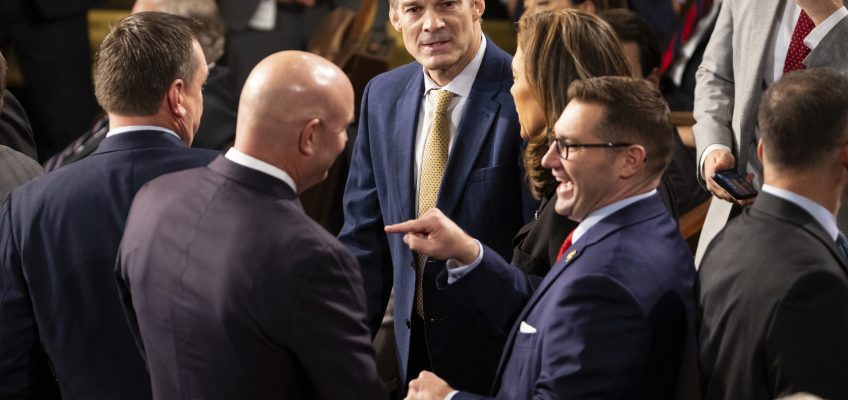In the classic film “Modern Times,” Charlie Chaplain tried to impress a woman by roller-skating while blindfolded. Again and again, the unwitting Chaplain skates perilously close to a cavernous hole. Only by happenstance does he avoid a fatal plunge.
Keep this image in mind if you’re tempted to send up a cheer or a sigh of relief that Jim Jordan has — for now — been denied the speakership of the House. If it’s a cause for celebration, it should be decidedly muted, because it’s another example of just how close America has repeatedly come to an all-out political catastrophe. It’s also a reminder that the more close calls there are, the more likely it is that at some point, the worst will indeed happen.
What we have witnessed over the past few days is less the triumph of a sensible, centrist-conservative, institutionally loyal contingent of House members, and more the unsettling fact that 200 lawmakers were willing to place outsize power in the hands of an insurrectionist who, as Liz Cheney noted, was closer to Donald Trump’s effort to overturn the 2020 election than any other House member. Yes, the “squishes” held firm, and kudos to them for defying the worst of their reputations. But what should have been a blatantly disqualifying record was largely treated as either irrelevant, or a mark of loyalty to the dominant figure in the Republican Party.
But perhaps we should not be surprised; that near-willingness to install Jordan two heartbeats from the Oval Office is just the latest example of a perilously close call that would have put our political system in serious jeopardy.
In 2020, a shift of 44,000 votes in three states would have resulted in an electoral tie, throwing the presidential race into the House of Representatives, where the arcane rules would have very likely led to a Trump reelection despite his clear popular vote loss.
On Jan. 6, a majority of House Republicans voted against certifying President Joe Biden’s election win. And within a few days or weeks, the base of the GOP — and a thumping majority of its elected officials — had come to terms with Trump’s efforts to overturn the election and remain in power by whatever means might work. But for the courage of local GOP officials in state legislatures and agencies, that effort might well have succeeded.
The 2022 midterms did not produce a red wave and some of the more zealous election deniers — Kari Lake in Arizona, Doug Mastriano in Pennsylvania — were defeated. But hundreds of election deniers won or were returned to seats in state legislatures and the U.S. House. Just as significant, Trump loyalists have won posts on canvassing boards, as election registrars, as county officials with significant power to judge the validity of votes. While new federal legislation makes it harder for Congress to reject certified electoral votes, the picture back at the grassroots is different: The potential for suppressing or rejecting valid votes may now be greater than it was in 2020.
All of this takes place in a political universe that would have seemed beyond belief little more than a decade ago. A presidential candidate indicted for multiple felonies, and found liable for sexual abuse and of having defrauded banks and insurers, would not be the overwhelming favorite to win his party’s nomination, let alone having an even or better chance of winning the White House, if current polls can be believed.
A major political party would not have embraced funhouse fantasies of electoral fraud, or joined in efforts to harass local prosecutors for pursuing credible criminal and civil cases. Nor would it have come this close to choosing a speaker of the House who willingly put our core political premise — the willingness to accept a peaceful transfer of power — at risk.
If Jordan isn’t ultimately able to seize power, another Trumpist is still likely to be handed the speaker’s gavel whenever this embarrassing chaos comes to an end. A new push to empower Rep. Patrick McHenry as acting speaker has already run aground amid a conservative backlash. Anything resembling bipartisan governance or deal-making with Democrats would not do.
Charlie Chaplin was never in any real danger —it was a triumph of special effects. The abyss we have repeatedly come close to is no illusion at all. And we cannot keep nearing that abyss without the real risk that sooner or later, we will slip over the edge.


Leave a Reply